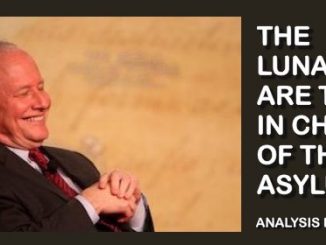
The American Domestic Distemper
It is NOT an enviable position for a great power to be dominated by a domestic Fifth Column in the service of that small foreign country. Who is that country and which guiding principle governs the decision making of the U.S. Government?
DR. ALAN NED SABROSKY
Winton Churchill is said to have described Russia in October 1939 as “a riddle, wrapped in a mystery, inside an enigma; but perhaps there is a key. That key is Russian national interest.” Much the same can be said about the United States today, although the key is very different. And others misapprehend this at their peril.
What Government?
Perhaps the most fundamental characteristic of the United States is that it simply does not form a government in the sense that every other nation of any political complexion does, even when one major political party controls the White House and both Houses of the  Congress. This is no accident; it exists by design. The Framers of the U.S. Constitution designed a system in which power was fragmented across the executive, legislative and judicial branches, and within the legislative branch – the Congress – between the Senate and the House of Representatives. The idea was to preclude a concentration of power anywhere within the Federal government, suitable for a minor nation on the periphery of the global balance of power in which most real power – as specified in the 10th Amendment to the Constitution – rested with the states or the people.
Congress. This is no accident; it exists by design. The Framers of the U.S. Constitution designed a system in which power was fragmented across the executive, legislative and judicial branches, and within the legislative branch – the Congress – between the Senate and the House of Representatives. The idea was to preclude a concentration of power anywhere within the Federal government, suitable for a minor nation on the periphery of the global balance of power in which most real power – as specified in the 10th Amendment to the Constitution – rested with the states or the people.
That is still the system, except that in the years since the US Civil War, real power has become increasingly concentrated in the Federal government, yet the fragmentation persists. Consider the current US administration. A Republican president faces almost as much opposition from his own party in both houses of the Congress as he does from the Democrats there. With few exceptions, a tortured vetting arrangement and lengthy appointments and confirmation process makes filling political positions within the executive branch glacially slow; there is no such thing as a “shadow government” within any opposition party. For example, after 10 months, only 17 political appointees in the Defense Department have been confirmed by the Senate and 14 others appear to be held up by the opposition of a Republican senator, which means that President Trump’s Secretary of Defense – James Mattis – is essentially trying to run a department consistent with the President’s guidance with President Obama’s holdover political appointees.
It gets worse. Foreign countries can negotiate with a US president but find conflicting signals being sent by the Administration, individual senators and representatives, or by one or both houses collectively of the Congress. President Obama encountered this phenomenon when he was negotiating a nuclear treaty with Iran while under continuous political attack from the Republican-dominated House of Representatives. Which one to believe? In the US system, the president negotiates treaties, but the Senate has to ratify them and may not do so – the US Senate’s failure to ratify the League of Nations agreement is a classic – and since money bills here originate in the House of Representatives, a failure there to fund can also mean a failure to implement. Executive orders can offset these obstacles to a degree, but only in part – and even then, all it takes is a single US District Judge to rule that a given agreement is unconstitutional, and the process restarts. It is a hell of a way to run a government.
The American Key: Domestic Politics First, Last and Always
Anyone brought up on any variant of Hans Morgenthau’s concept of foreign policy guided by the national interest defined in terms of power faces a great disappointment when dealing with the United States. Politicians and the media refer to it often, but no one is really quite sure what it means. There was a general consensus during the early years of the Cold War on the need to contain the USSR (and then China), and to oppose communist insurgencies or revolutions everywhere. That took the US into Vietnam, and the foreign policy consensus essentially died there. The implosion of the Soviet Union did not recreate it, although it did seem to promise something close to American hegemony – which has meant in part giving the US almost free rein to intervene militarily in places it would never have dared go were the USSR still around. And it remains to be seen if Russia and China will offset that tendency.
For American politicians, with a single exception (to which I will return later), foreign policy is simply domestic politics played out on a larger stage. Now, domestic politics obviously play a role in any government’s foreign policy, whether it involves a dictator’s efforts to forestall potential rivals or an elected politician’s determination to appeal to enough of his or her domestic constituency to gain support for policy and ensure (if possible) re-election.
But in the US, those domestic political issues are controlling. A useful starting point to understand the process is a very good book by the late French scholar, Raymond Aron, called The Imperial Republic. I cannot imagine what people and leaders abroad must think when they realize that the leadership of any major power – much less one like the United States today – are selected not so much with an eye to their views of the world, but on their positions on  abortion, homosexual marriage or transgender access to public bathrooms, to name but a few. When one factors in the unbelievable ignorance of much of the American public about history, geography and international politics – I recall that even in the 1980s, nearly half of the American public believed that the USSR was part of NATO (!), and today many college students do not know that the US itself had a Civil War – one can only shudder at the international political implications. Knowledge of sports, Hollywood sexual scandals and stocks is just not an adequate substitute. Elections here aren’t quite like letting the inmates of an asylum pick the caregivers, but it is uncomfortably close.
abortion, homosexual marriage or transgender access to public bathrooms, to name but a few. When one factors in the unbelievable ignorance of much of the American public about history, geography and international politics – I recall that even in the 1980s, nearly half of the American public believed that the USSR was part of NATO (!), and today many college students do not know that the US itself had a Civil War – one can only shudder at the international political implications. Knowledge of sports, Hollywood sexual scandals and stocks is just not an adequate substitute. Elections here aren’t quite like letting the inmates of an asylum pick the caregivers, but it is uncomfortably close.
Fourth Estates and Fifth Columns
The role the mainstream media plays in this process is complicated. Historically the so-called Fourth Estate has fomented or at least made more likely several wars, including the Mexican War (1846-48), the US Civil War (1861-65) and the Spanish-American War (1898), and its opposition contributed to the US defeat in Vietnam, so it has a fairly tortured legacy. Today it has two important characteristics with political consequences. One is that the mainstream media are overwhelmingly liberal and partisans of the Democratic Party, so the agenda and political views they convey with little opposition to a largely unknowing public are those of liberals ideologically and Democrats as politicians. This at best complicates matters for a conservative Republican president, and anyone watching (e.g.) CNN giving literally hours of venomous criticism of anything Mr. Trump does or is accused of doing, will understand this. There is in many instances not even a pretence of balance or objectivity – watching (e.g.) MSNBC makes it clear that to many prominent purveyors of – well, not “news” but whatever substitutes for it these days – journalism here as it was classically understood is an anachronism.
Overlapping this characteristic of the media is a second characteristic which has explicit international consequences. This is that almost all of the media are now Jewish-owned and – in concert with AIPAC (the American Israel Public Affairs Committee) – the driving force in US policy in the Middle East. Essentially, Jewish ownership of the media  encompasses every major network (e.g., ABC, CBS, NBC, CNN, Fox), every major national newspaper (e.g., Wall Street Journal, New York Times, Washington Post, USA Today), all three weekly news magazines (Time, Newsweek, US News & World Report), most major publishing houses, and most political journals across the ideological spectrum. There is some diversity of opinion and information on US domestic politics, at least within the ideological parameters noted above. There is a similar diversity on issues in many parts of the world. But in the Middle East, the American public gets the story Israel wants told – especially the right wing in Israel, which is very far to the right indeed.
encompasses every major network (e.g., ABC, CBS, NBC, CNN, Fox), every major national newspaper (e.g., Wall Street Journal, New York Times, Washington Post, USA Today), all three weekly news magazines (Time, Newsweek, US News & World Report), most major publishing houses, and most political journals across the ideological spectrum. There is some diversity of opinion and information on US domestic politics, at least within the ideological parameters noted above. There is a similar diversity on issues in many parts of the world. But in the Middle East, the American public gets the story Israel wants told – especially the right wing in Israel, which is very far to the right indeed.
This creates the single policy exception to which I referred earlier: a US government bonded to an Israel few Americans would ever support if they saw, heard and read what people in most of the rest of the world see, hear and read. But Americans do not do that, nor are they likely to do that in the near future – if at all. This creates a powerful bipartisan base of public support for Israel to which politicians must respond. Added to this is AIPAC, which among other things essentially owns the US Congress – both houses, both parties – and through its control of the Senate, the political appointments process which gives the Israel lobby great influence within the executive branch. Extending AIPAC’s influence is that exercised by CUFI (Christians United for Israel), an AIPAC clone whose director and director of communications are Jewish (!) and a product of AIPAC’s assiduous cultivation of evangelical Protestant pastors from the 1960s on.
And last is the enormous amount of Jewish money in the political process itself, now that barriers to monetary contributions have been lifted, and thus of the two major political parties themselves. It is no accident that aspiring politicians of both parties troop hats in hand to a few  Jewish billionaires like Haim Saban (pictured) or George Soros (if Democrats); Sheldon Adelson (pictured) or Paul Singer (if Republicans); or independents like Michael Bloomberg (both). Jews certainly are not the only ones contributing to the process, but they clearly have the controlling edge – even if no one of prominence in the US dares say it openly.
Jewish billionaires like Haim Saban (pictured) or George Soros (if Democrats); Sheldon Adelson (pictured) or Paul Singer (if Republicans); or independents like Michael Bloomberg (both). Jews certainly are not the only ones contributing to the process, but they clearly have the controlling edge – even if no one of prominence in the US dares say it openly.
This explains why American presidents and politicians with rare exceptions pledge fealty to Israel as part of their campaigns. Why the US essentially has spent a quarter-century rampaging across the Middle East as Israel’s “800 pound gorilla,” ravaging Israel’s enemies at no cost to Israel itself. Why President Trump – aside from personal history and family ties – had his UN ambassador open her tenure by condemning the “anti-Israel bias” of the United Nations, and later withdraw from UNESCO (originally a US creation) for the same reason.
So the key (returning to Churchill on Russia) to understanding what the US is likely to do is to understand what interest, if any, Israel has in a particular country or issue. Do that and you will not go far wrong. Some American politicians may break ranks occasionally – Congresswoman Tulsi Gabbard (D-HI) is one – but none with higher ambitions: the alignment of money, media and mass political organizations is simply too powerful. For a great power to be hostage to the actions of a bellicose small one is not unknown historically – Imperial Russia had such a bond to Serbia before WWI that surpassed Russia’s interest in the Balkans, and which did not turn out well for it. But it is not an enviable position for the great power itself to be dominated by a domestic Fifth Column in the service of that small foreign country. The spirits of Dwight Eisenhower and John Kennedy must be ashamed and appalled.
_______________________
About the author
 Alan Ned Sabrosky (Ph.D, University of Michigan) is a ten-year US Marine Corps veteran. He served in Vietnam and is a graduate of the US Army War College.
Alan Ned Sabrosky (Ph.D, University of Michigan) is a ten-year US Marine Corps veteran. He served in Vietnam and is a graduate of the US Army War College.




